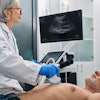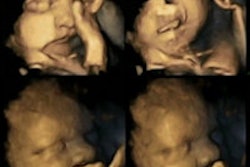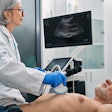Dear AuntMinnie Member,
The annual meeting of the American Institute of Ultrasound in Medicine (AIUM) is in full swing this week, and Senior Editor Erik L. Ridley is on hand in Orlando, FL, filing reports for our Ultrasound Community.
First up is an article on how lung ultrasound could serve as an alternative to chest x-ray for diagnosing pneumonia in children, thus avoiding the use of radiation in this sensitive patient population. Lung ultrasound is also highly portable and accurate, according to the researchers from New York. Find out how it performed versus radiography by clicking here.
Also at AIUM 2015, Dr. Wesley Lee of Baylor College of Medicine delivered an address on Sunday on the technical advances needed to move fetal ultrasound forward in the coming years. You'll find that article by clicking here.
In other ultrasound news, researchers from the U.K. have demonstrated that 4D ultrasound isn't just for keepsake videos. They used the technology to analyze the movements of fetuses and discovered differences between those whose mothers smoked and those who didn't. Get the story here.
Finally, don't leave the community before checking out two more new articles, one from Doug Wuebben on a possible downside of the rapid growth in ultrasound utilization, and another by Dr. Roy Filly on the importance of reading ultrasound studies using dynamic clips.
Get these stories and more, including additional AIUM coverage, in our Ultrasound Community at ultrasound.auntminnie.com.
Patients want radiation info
In other news, a new study published today in Radiology indicates that patients in general want more information about the risks and benefits of medical radiation. But radiologists might not be happy to hear that most patients said they would prefer to get that information from the physician managing their care, rather than their radiologist.
Researchers from Memorial Sloan Kettering Cancer Center used focus groups to assess the opinions and attitudes of 30 patients seen at their center regarding radiation. Patients generally understood that there were clear benefits to imaging exams, but they were somewhat unclear on which tests used radiation and which ones didn't.
Also, while patients said they would prefer to get information about radiation from their oncologist, these discussions often weren't taking place -- perhaps due to time pressures. Read about some of the researchers' recommendations for fixing the situation by clicking here, or visit our CT Community at ct.auntminnie.com.



















